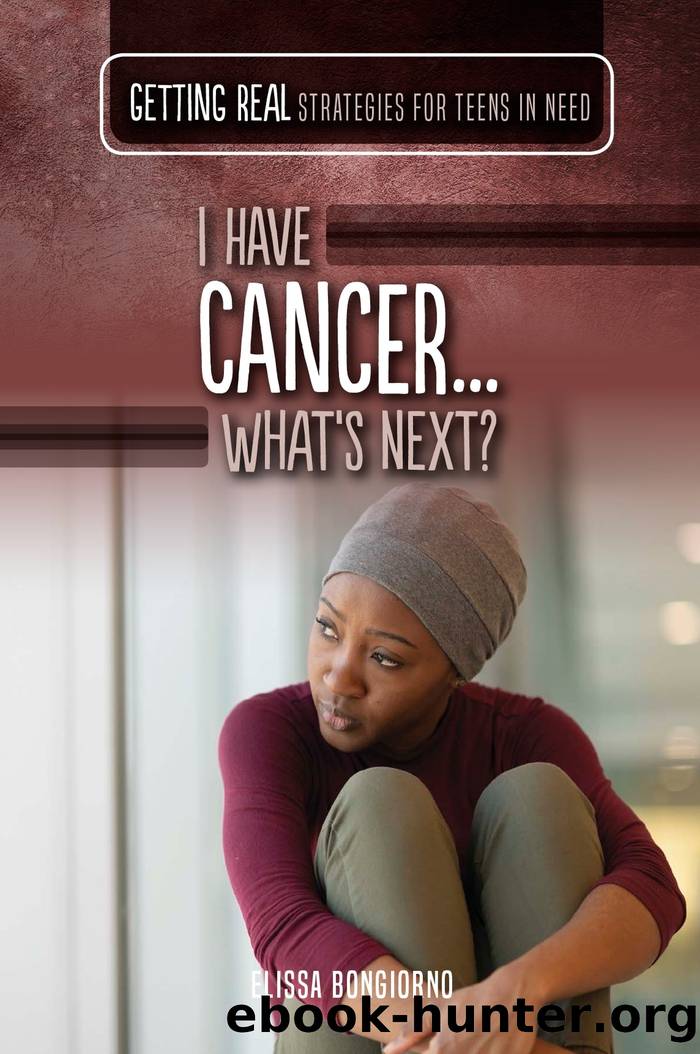I Have Cancer...What's Next? by Elissa Bongiorno

Author:Elissa Bongiorno
Language: eng
Format: epub
Publisher: The Rosen Publishing Group, Inc
Published: 2021-07-30T00:00:00+00:00
How someone comes to terms with a cancer diagnosis is a personal decision. Choosing whom to tell and whom to ask for support is a part of the process. Thereâs no right or wrong way to do it. Just make sure you reach out.
After processing the emotions that come with a cancer diagnosis, itâs all right to feel hope. Let yourself believe that youâll be healthy again. The power of positive thinking can make a difference.
THEREâS HOPE!
There are excellent reasons to feel hope, even after a diagnosis of cancer. Modern treatment methods have helped millions of people become cancer survivors. Theyâre now cancer-free. Other cancer patients are living many productive years with their cancer under control in the same way that people with other chronic diseases manage their illnesses. Some doctors believe that if a patient has a strong will to live and a positive attitude, it can make a difference in recovery.
YOUâVE GOT A FRIEND
If you have a friend or family member whoâs been diagnosed with cancer, it can be a scary timeâeven terrifying. But you can help. Itâs okay to be afraid, but remember that you can make a difference in your friend or family memberâs life. A cancer diagnosis can be a scary thing, but as a friend, you can help lighten the load. Here are some suggestions.
⢠BE THERE. Itâs natural to be scared of someoneâs cancer diagnosis, but remember, theyâre even more terrified. The most important thing to do is to just be there for your friend. Donât avoid them. Theyâre the same person they were before their diagnosis, and you are too.
⢠CHECK IN WITH CALLS, TEXTS, EMAILS. Follow their lead. They may be tired or unable to hang out because of immune issues. If theyâre not up for a visit, send a card or text a funny meme.
⢠LISTEN UP. After a cancer diagnosis, your friend or family member is working through a lot of emotions. Ask what they need and listen to their answer. If theyâd like a visit, you can arrange to stop by. But never visit a cancer patient when youâre feeling sick. Their immune system doesnât need to be taxed by a cold or flu. When they talk, donât insist that theyâll be all right. Let them have space to discuss their emotions, if theyâd like. Or just let them sit in silence. Follow their lead.
⢠HELP OUT. A wonderful thing about friendship is being able to help each other. Ask if you can help with chores, such as laundry or cleaning up around the house. See if they need items from the grocery store, or if theyâd like someone to walk their dog. By helping your friend, youâre also letting them know youâre there for them, which is a powerful offering.
Download
This site does not store any files on its server. We only index and link to content provided by other sites. Please contact the content providers to delete copyright contents if any and email us, we'll remove relevant links or contents immediately.
Rising Troublemaker by Luvvie Ajayi Jones(166)
How To Not Make Adulting Suck by Farias I.C(157)
The Security Breach Files: An AFK Book (Five Nights at Freddy's) by Scott Cawthon(140)
Killing the Wittigo by Suzanne Methot(131)
You Are Simply Perfect! a Mindfulness and Self-Awareness Guide for Tweens and Teens by Sadia Saeed(130)
Your Food Is Fooling You by David A. Kessler M.D(129)
The Teen Witches' Guide to Crystals by Xanna Eve Chown(128)
The Anxious Thoughts Workbook for Teens by David A. Clark(124)
Self-Injury and Cutting by John M. Shea(123)
My Anxiety Handbook by Sue Knowles(120)
The Outrage by William Hussey(119)
Success Express for Teens by Leslie Roger;(117)
Using the Express Tools by Unknown(115)
Healthy Living for Teens by Youth Communication(112)
Social Anxiety Relief for Teens by A Step-By-Step Cbt Guide To Feel Confident & Comfortable In Any Situation(112)
Toning for Teens by Joyce L. Vedral(112)
The Anxiety and Depression Workbook for Teens by Michael A. Tompkins(106)
Cash is Queen by Davinia Tomlinson(99)
A Higher Calling by Dana Isaiah Thomas(99)
